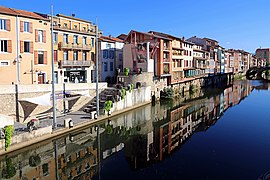Castres
Castras (Occitan) | |
|---|---|
Subprefecture and commune | |
 Houses by the Agout | |
| Coordinates: 43°36′00″N 2°15′00″E / 43.6000°N 2.2500°E | |
| Country | France |
| Region | Occitania |
| Department | Tarn |
| Arrondissement | Castres |
| Canton | Castres-1, 2 and 3 |
| Intercommunality | CA Castres Mazamet |
| Government | |
| • Mayor (2020–2026) | Pascal Bugis[1] (DVD) |
Area 1 | 98.17 km2 (37.90 sq mi) |
| Population (2021)[2] | 42,672 |
| • Density | 430/km2 (1,100/sq mi) |
| Demonym | Castrais |
| Time zone | UTC+01:00 (CET) |
| • Summer (DST) | UTC+02:00 (CEST) |
| INSEE/Postal code | 81065 /81100 |
| Elevation | 151–367 m (495–1,204 ft) (avg. 170 m or 560 ft) |
| 1 French Land Register data, which excludes lakes, ponds, glaciers > 1 km2 (0.386 sq mi or 247 acres) and river estuaries. | |
Castres (French: [kastʁ] ; Castras in the Languedocian dialect of Occitan) is the sole subprefecture of the Tarn department in the Occitanie region in Southern France. It lies in the former province of Languedoc, although not in the former region of Languedoc-Roussillon. In 2018, the commune had a population of 41,795.
Castres is the fourth-largest industrial centre of the predominantly rural former Midi-Pyrénées region after Toulouse, Tarbes and Albi, as well as the largest in the part of Languedoc lying between Toulouse and Montpellier. It is noted for being the birthplace of the famous socialist leader Jean Jaurès (1859–1914) and home to the important Goya Museum of Spanish painting.[3]
- ^ "Répertoire national des élus: les maires" (in French). data.gouv.fr, Plateforme ouverte des données publiques françaises. 13 September 2022.
- ^ "Populations légales 2021" (in French). The National Institute of Statistics and Economic Studies. 28 December 2023.
- ^ Goya Museum Archived 2009-10-04 at the Wayback Machine, Les amis des Musées de Castres.



